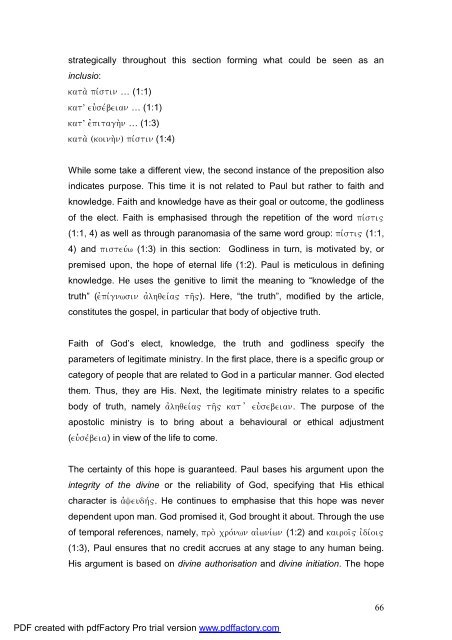A Text centred rhetorical analysis of Paul's Letter to Titus
A Text centred rhetorical analysis of Paul's Letter to Titus
A Text centred rhetorical analysis of Paul's Letter to Titus
Create successful ePaper yourself
Turn your PDF publications into a flip-book with our unique Google optimized e-Paper software.
strategically throughout this section forming what could be seen as an<br />
inclusio:<br />
kata; pivstin … (1:1)<br />
katÆ eujsevbeian … (1:1)<br />
katÆ ejpitagh;n … (1:3)<br />
kata; (koinh;n) pivstin (1:4)<br />
While some take a different view, the second instance <strong>of</strong> the preposition also<br />
indicates purpose. This time it is not related <strong>to</strong> Paul but rather <strong>to</strong> faith and<br />
knowledge. Faith and knowledge have as their goal or outcome, the godliness<br />
<strong>of</strong> the elect. Faith is emphasised through the repetition <strong>of</strong> the word pivsti~<br />
(1:1, 4) as well as through paranomasia <strong>of</strong> the same word group: pivsti~ (1:1,<br />
4) and pisteuvw (1:3) in this section: Godliness in turn, is motivated by, or<br />
premised upon, the hope <strong>of</strong> eternal life (1:2). Paul is meticulous in defining<br />
knowledge. He uses the genitive <strong>to</strong> limit the meaning <strong>to</strong> “knowledge <strong>of</strong> the<br />
truth” (ejpivgnwsin ajlhqeiva" th`"). Here, “the truth”, modified by the article,<br />
constitutes the gospel, in particular that body <strong>of</strong> objective truth.<br />
Faith <strong>of</strong> God’s elect, knowledge, the truth and godliness specify the<br />
parameters <strong>of</strong> legitimate ministry. In the first place, there is a specific group or<br />
category <strong>of</strong> people that are related <strong>to</strong> God in a particular manner. God elected<br />
them. Thus, they are His. Next, the legitimate ministry relates <strong>to</strong> a specific<br />
body <strong>of</strong> truth, namely ajlhqeiva" th`" kat j eujsebeian. The purpose <strong>of</strong> the<br />
apos<strong>to</strong>lic ministry is <strong>to</strong> bring about a behavioural or ethical adjustment<br />
(eujsevbeia) in view <strong>of</strong> the life <strong>to</strong> come.<br />
The certainty <strong>of</strong> this hope is guaranteed. Paul bases his argument upon the<br />
integrity <strong>of</strong> the divine or the reliability <strong>of</strong> God, specifying that His ethical<br />
character is ajyeudhv". He continues <strong>to</strong> emphasise that this hope was never<br />
dependent upon man. God promised it, God brought it about. Through the use<br />
<strong>of</strong> temporal references, namely, pro; crovnwn aijwnivwn (1:2) and kairoi`" ijdivoi"<br />
(1:3), Paul ensures that no credit accrues at any stage <strong>to</strong> any human being.<br />
His argument is based on divine authorisation and divine initiation. The hope<br />
PDF created with pdfFac<strong>to</strong>ry Pro trial version www.pdffac<strong>to</strong>ry.com<br />
66

















